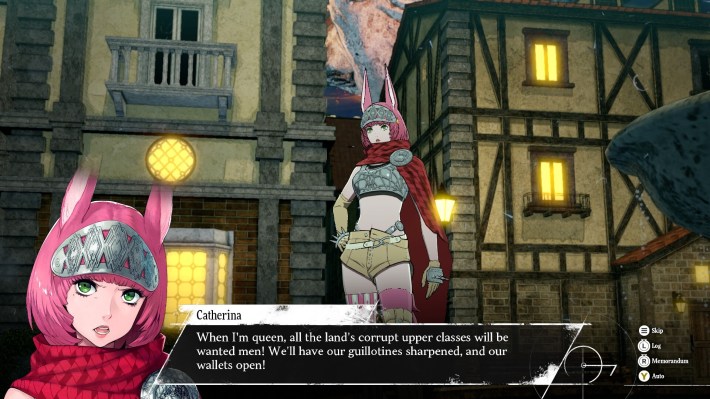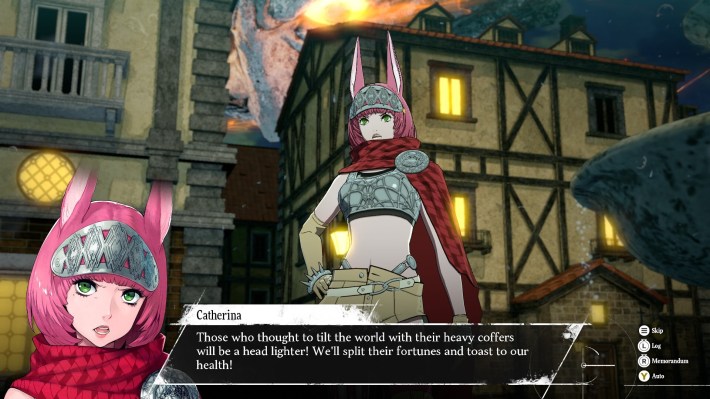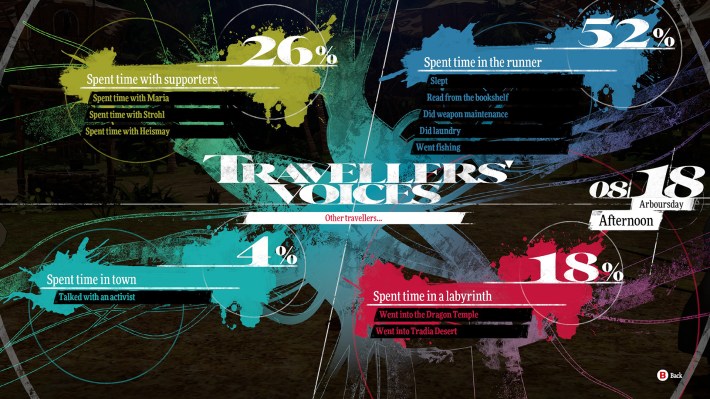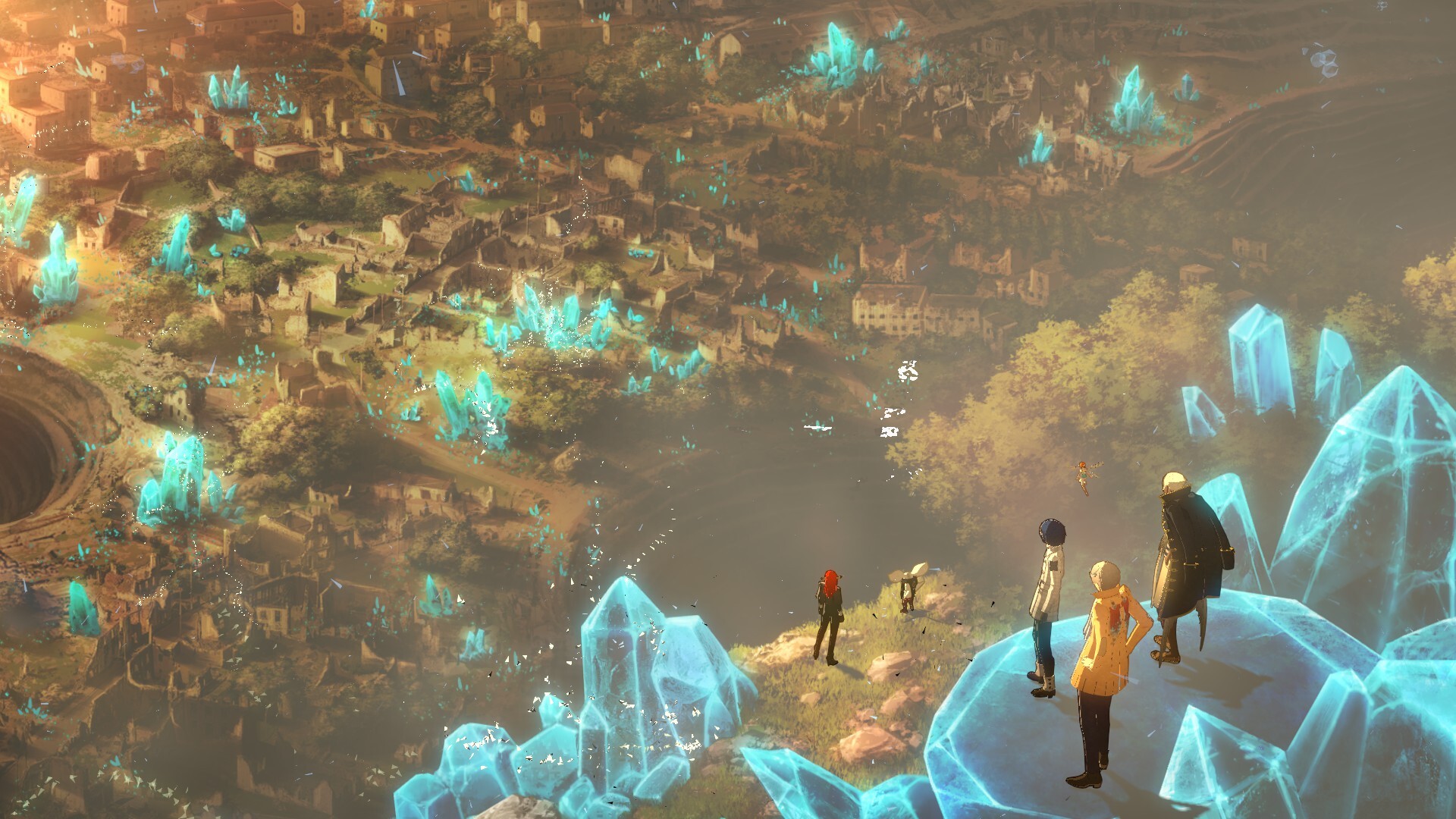Japanese RPGs (JRPGs for short) do a lot of things right, but one thing they are not particularly known for is respecting the player's time. Whereas Western AAA games like Horizon: Zero Dawn, Assassin's Creed, or even the newer Legend of Zelda entries, pad their runtimes with open-world shenanigans, JRPGs usually earn their 100-plus hour runtimes the old-fashioned way: with a slow pace, lots of cutscenes and dialog, and grinding monsters for experience. At times, playing a JRPG can feel like watching a particularly engaging anime, if during every commercial break had you complete a puzzle or fight a monster before getting back to the show.
Metaphor: ReFantazio (let's get this out of the way: the name is dumb) isn't immune to this, especially at the beginning. The newest game from Japanese developer Atlus, makers of the Persona series as well as the more hardcore Shin Megami Tensei series, is a bit of a slow burn. Like their breakthrough masterpiece Persona 5 before it, the first couple of hours of Metaphor are an extended tutorial, which in practice boils down to doing scripted fights in between grand cutscenes that lay out the setting.
To summarize that setting: This fantasy world is besieged by giant Attack on Titan–esque monsters (called "humans," which is hilariously unsubtle), and a recent regicide. The king gets got by main antagonist Louis, which sets off a chain of events where the king's magic elevates the castle into space and then his face appears on the rock, a la Majora's Mask, and invents democracy. Really. The king-rock says that whoever has the most support from the populace at the end of an arbitrary period of time will be the new king.
Anyway, this is all told via cutscenes and endless conversations, but once the game gets going, it's easy to fall into a flow that feels snappier than any JRPG I've ever played. The general premise is very similar to Persona 5—though there's more to it, it wouldn't be unfair to call Metaphor "Persona 5 but fantasy"—in that you, as the main character, have a finite number of days, split into afternoons and evenings, to do a variety of activities, and one of the main goals of the game is to optimize how you spend your time. In both games you have to hang out with your companions and allies to improve your "social rank" with them, unlocking more abilities and items, as well as their personal storylines. You also have to work on your character's traits, such as Kindness in Persona and Tolerance in Metaphor, in order to further unlock conversation options and quests. And you have to go into a variety of dungeons to progress the story and level up your characters.
Where Metaphor veers away from the Persona formula is with the optional dungeons. Unlike Persona 5, whose only optional dungeon was the monotonous Mementos, these new dungeons are varied and have interesting creatures and bosses, from treasure-chest mimics with weird tongues to giant oxen-men, and rewards worth hunting down, such as better weapons or the extremely important and extremely rare items that restore your characters' magic points. The dungeons break up the general rhythm of the game, so that you are not simply talking to everyone in town for days on end before getting to the action.
Not that you don't want to talk to everyone, though. Whereas the Persona series is rooted in the world of high school, with high schooler problems even in elevated RPG form, Metaphor has mostly adult characters, and so the stakes feel more mature, the conversations a lot weightier. Take Strohl, the first companion you recruit, a noble who saw his home destroyed by one of the aforementioned humans after the army refused to come help, under the orders of that bastard Louis (the characters in the game love calling him "the bastard Louis"). Strohl spends his time trying to restore his home and village, not for personal glory or revenge, but to give the people who lived under his family's rule a new place to live and grow. If that's not your bag, Heismay, a mouse-like knight/ninja with creepy red eyes, spends his story trying to come to terms with his son's (brutal as hell) death. It's real depressing shit! These are just two of the 14 characters I've seen so far, and they all have storylines worth seeking out.
This focus on heavier and more engaging themes gives vitality and urgency to the gameplay, even before taking into account the slowly dwindling day count on the calendar. With the engrossing side stories and the fact that combat is a perfection of the Persona series, it's addicting to go through the days while awaiting the big set pieces, which for the most part do not disappoint. This is an epic game, in the classic sense of the word, and while that's silly at times—in the ways fantasy is often silly—the game is impressive in its scale and its understanding of various conflicts with real-world analogues: the powerful rich vs. the working masses, the corrupt church vs. the secular government, racism (so much racism!), and the question of kindness in a world seemingly devoid of it.


To go back to the combat: It's the best turn-based system I've ever played, filled with flashy attacks and a rock-paper-scissors system of strengths and weaknesses that must be mastered in order to complete the game. The fighting system's best feature is one that actually skips combat altogether, and it's one that flies in the face of the JRPG genre. In other games, no matter how strong the character gets, they always have to go into battle and one-shot weaker monsters that have little value to the player. However, in Metaphor, monsters sufficiently weaker just get killed in the overworld, avoiding the combat altogether but still giving rewards. This makes dungeon exploration much less tedious, as you only have to fight monsters that provide a greater challenge and, therefore, a greater reward.
I am only 50 hours into what seems to be an 80-plus-hour experience, but Metaphor has made those 50 hours fly by. I've never felt like a JRPG, or really any RPG, was designed with the player so in mind. (I'm sure there are others like this; please let me know in the comments so I can play them.) Even the way the map is laid out, with items clearly shining blue and visible, feels made to avoid the FOMO that comes with the kinds of games that hide their best items in intentionally out-of-the-way locations.
I have to make a quick aside here, as a confession. For pretty much my entire gaming life, I have always been a guide reader. It's not something I particularly enjoy being, but whenever I start a new game, particularly an RPG, I have to pull up not just a walkthrough, but also guides on how to best optimize my characters. It's really annoying sometimes; I can't just sit on the couch and play a game on my Nintendo Switch without pulling up a walkthrough on my phone or laptop, and one of the reasons I end up playing most games on my computer is because I can have guides open on my second monitor. Back in my youth, I also did the analog version of this, to the chagrin of my parents, printing hundreds of pages of Final Fantasy walkthroughs from GameFAQs.
I think the urge for this comes from a particularly intense sense of the aforementioned FOMO. I was never the type of player who enjoyed digging into every square inch of a game's map, but I do love getting the items placed in those spaces. It has been much easier, and more fun, to have key items spelled out and located for you in a guide, so that you can focus on the better parts of the game, i.e. playing it and experiencing the story.
I've tried to change my approach with certain games over the years, often ones I play right as they release. I made it through the first third of Dragon's Dogma 2 earlier this year without a guide, only to lose interest because that game just blindly throws you into a big world and expects you to figure it out. (Elden Ring does this too, but I will admit to reading walkthroughs and class guides from the jump with that one. No shame, it's a massive game and I am very bad at playing it.) For Persona 5, I used a walkthrough to tell me exactly how to spend my days in order to optimize my time before the finale.
Thanks to all of the quality of life improvements in Metaphor, I have not felt the need to look at a guide once. As Aftermath writer Nathan Grayson said, Metaphor serves as its own guide, trusting the player to use the tools given to them in order to figure out where to go next or what to do with your afternoons and evenings. Metaphor asks to connect to the internet whenever you play in order to show you a very valuable screen:

This screen shows you the percentage of players who did which activity at the specific time you find yourself in the game. This screenshot was taken about 30 hours in, shortly after the third major dungeon in the game, and even with that chunk of the game under my belt, it was still helpful. Is this the same as consulting a guide another player wrote? In some ways, sure, as I am not figuring out every detail of my calendar in-game by myself, but its inclusion in the game directly is the point. Metaphor never hides information from the player, hoping to provide difficulty from the combat rather than from obtuse exploration. (Even the combat comes with more information than games often give; the player can buy information from an in-game Informant who gives clues on bosses' strengths and weaknesses. This allows the player to better prepare for big fights.)
If there is one place where Metaphor is more complicated than it might need to be, it's with Archetypes, the game's version of classes/jobs. There are a lot of them, and it's not always clear how to unlock new ones; the majority come from ranking up with your buddies, but some are quests that the game doesn't scream at you about. This goes double for the latter forms, which are both confusing to unlock and grueling to level. To give an example: I want to unlock the Samurai job, but that requires leveling two other jobs to max level, and a third about halfway before I can even start playing as a Samurai. It's a lot.
However, all of this does roll back into the game's respect for your time. The way the Archetypes are slowly but surely unlocked lets you fully experiment with new ones before the game throws another shiny toy at you. And, in maybe my favorite feature of this already excellent game, if you max out an Archetype to level 20, you can keep using it; once you get 1000 experience points past max level, the game gives you an item that lets you put 1000 experience points into another Archetype. There's no wasted experience, and therefore no wasted time. Everything you do, in combat and in conversations, has a purpose, and that purpose is to make the game as frictionless as possible without removing the things that make JRPGs so addicting.
There's always going to be space in my diet for a game that actively hates me. That's the way I'm wired, and though I will almost certainly use a guide for that type of game, it'll still be a worthwhile experience. However, Metaphor has perhaps permanently rewired my brain for what kind of behavior I do not want to put up with in search of a good gaming experience. It's startling that all it took was a game working with the player, rather than against them, for me to realize that there is in fact a better way than endless grinding and poring over thousands of words in guides in order to enjoy a deep experience. I will measure all future JRPGs up against Metaphor: ReFantazio, and I hope that any of them measure up to how purely enjoyable an experience this has been.






